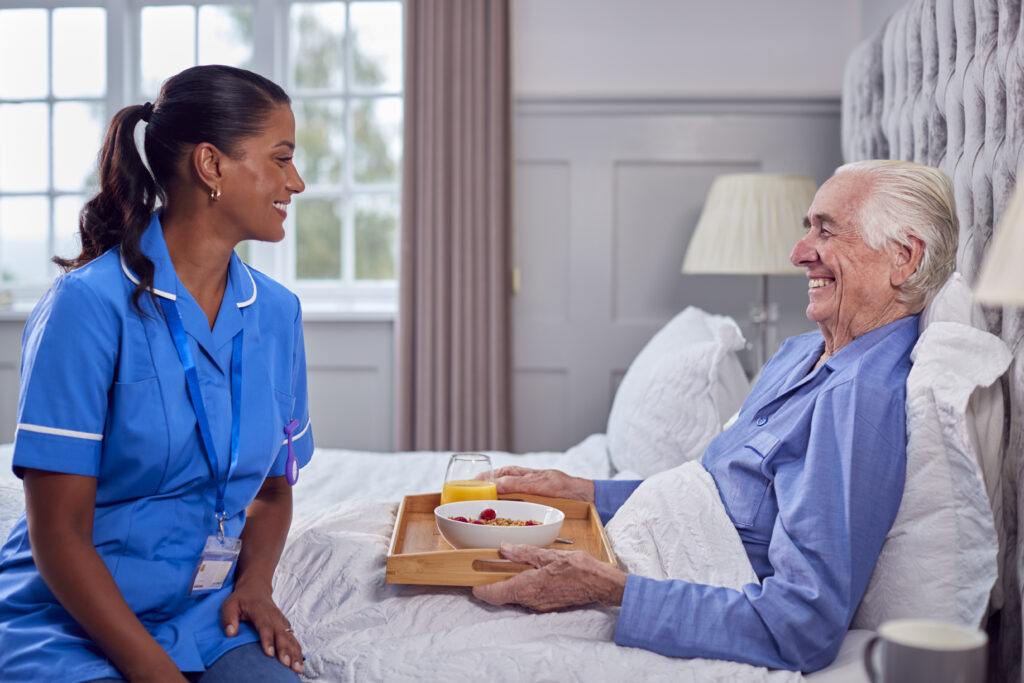24-Hour Home Care
Quality Health Services provides the best service to those in need. As our name states, we put quality above all, most importantly in the care that we provide. QHS performs comprehensive screenings in our search for the most experienced, reliable, and compassionate caregivers in the industry. We regularly train our caregivers to enhance their skills concerning safety, health and wellness of all our clients. Our goal is to help our clients achieve the highest level of independence and live meaningful lives.
If you or your loved one needs around-the-clock care, you may be wondering whether live-in care or hourly care is a good option. What’s the difference between live-in care and hourly home care, 24-hours per day? What are the benefits of live-in care for seniors? What’s included in 24-Hour care? How do you find the best live-in care near you? Quality Health Services can help!
What Is Live-In Care for Seniors?
Live-in senior care involves a primary caregiver living in a person’s home for 4-5 days a week (with a secondary caregiver living in the home the remaining 2-3 days) while providing around-the-clock care – with some exceptions. The caregiver must be given 8 hours off each night and a bed to sleep in as well as a 4-hour break every day.
-Since live-in caregivers get 8 hours off to sleep and an additional 4 hours off during the day, live-in home care tends to be cheaper than hourly home care.
Depending on the person’s needs, a loved one may be able to care for them overnight and during the daily break, or the family may choose to pay for part-time caretakers to cover the breaks.
Benefits of 24-Hour Home Care
Live-in home care has a variety of benefits compared to an assisted living facility or a nursing home.
Ability to Age in Place
More than 3 out of 4 (77%) adults 50 and older want to remain in their homes for the long term. Live-in home care allows these seniors to age in place and stay in the home where they are comfortable rather than being forced to move into an unfamiliar environment.
Maintaining Independence
Most seniors still want the ability to eat what and when they want, get up when they want, have visitors when they want, and make other decisions for themselves. Nursing homes and assisted living facilities often take away many of these options, removing much of a person’s independence.
Familiarity
Seniors may have spent decades in their current homes. They know where everything is, they’re familiar with their neighbors, and they know where the nearest grocery store and bank are. Moving means giving up all that familiarity, while live-in care for seniors helps them retain it.
Customized Care and Individual Attention
Unlike in an assisted living facility or nursing home, 24-hour home care is completely customizable to what the senior needs. In a facility, you or your loved one would be sharing caregivers with many other seniors and encounter something like assembly-line care. When you choose live-in care, your caregiver is devoted entirely to your needs and doesn’t need to rush off to help somebody else.
Providing the best 24-Hour Home Care for seniors and families in Dubois, Punxsutawney, Bellefonte, Jefferson, Brockway, Brookville, Clearfield, St Marys, Emporium, Philipsburg, State College, Port Matilda, Tyrone, Bellwood, Altoona, Hollidaysburg, Roaring Spring, Gallitzin, Cresson, Lilly, Ashville, Loretto, Ebensburg, Sidman, Nanty Glo, Colver, Northern Cambria, Hastings, Johnstown, PA and surrounding areas.

What Services Are Included in 24-Hour Home Care?
Live-in home caregiver duties vary depending on the caregiver’s training, but they typically include:
- Assistance with activities of daily living, such as bathing, dressing, eating, toileting, and grooming
- Light housekeeping, such as sweeping and dusting
- Local transportation to appointments or running errands
- Meal planning and preparation
- Assistance with paperwork or paying bills
- Help with pets
- Laundry
- Transfers into and out of a wheelchair
- Medication reminders
- Companionship
It’s easy to discount the importance of companionship, but the Centers for Disease Control and Prevention (CDC) calls loneliness and social isolation “serious public health risks.” In fact, they go on to say that:
“Social isolation significantly increased a person’s risk of premature death from all causes, a risk that may rival those of smoking, obesity, and physical inactivity.”
Disease Control and Prevention (CDC)
When your aging loved one needs home care services in the Northern and Central PA areas, Quality Health Services is there for you.

How Can I Tell if My Parent Needs 24-Hour Home Care?
Here are some signs your parent may benefit from live-in care:
- Unexplained weight changes
- Unkempt home
- Lost interest in hobbies
- Increased isolation
- Lost mobility or increase in falls
- Needing reminders to take medication
- No longer able to do daily tasks to care for themselves or their home
How Can I Find the Right 24-Hour Home Care Provider?
As you look into various agencies, be sure to ask plenty of questions to make sure you understand what services you will be getting, when they will be provided, who will be providing them, and how the agency hires, trains, and places caregivers.
What Is the Difference Between Live-In Home Care and Hourly Home Care?
Since hourly home care can include 24-hour care, the difference between live-in home care and hourly home care may seem confusing, but in the simplest terms, live-in caregivers must be given 8 hours off every night to sleep (as well as a bed to sleep in), while hourly caregivers are paid to stay awake for their entire 8-12 hour shift. Also, you’ll typically only have 2 live-in caregivers (like one for weekdays and one for weekends), but you’ll see at least 2-3 caregivers per 24-hour period for hourly care and as many as 6 during the course of a week.
Since live-in caregivers get 8 hours off to sleep and an additional 4 hours off during the day, live-in home care tends to be cheaper than hourly home care. However, if you or your loved one needs truly around-the-clock care, you may need an additional caregiver to cover the hours of your live-in caregiver.
Does Medicare Pay for 24-Hour Home Care?
No, Medicare does not cover 24-Hour Home Care.


